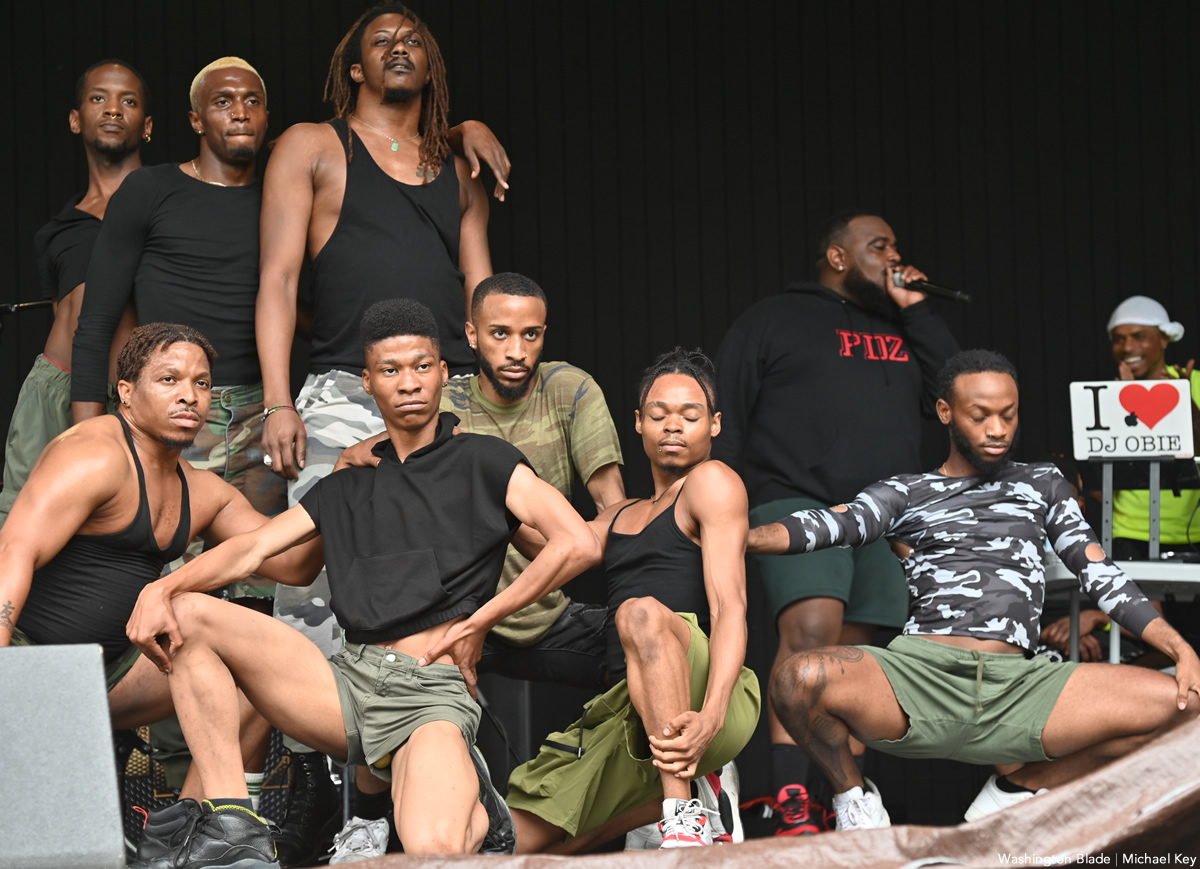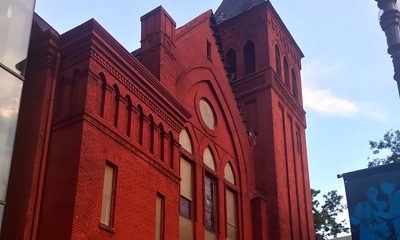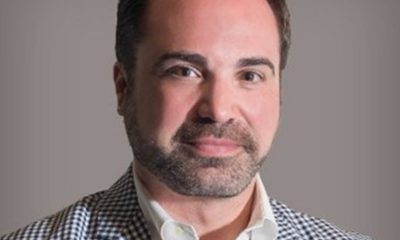Local
Sexual assault may be dropped in Wone murder case
The lead prosecutor in the Robert Wone murder case startled courtroom spectators last
The lead prosecutor in the Robert Wone murder case startled courtroom spectators last week when he said the government would likely drop its theory that Wone was immobilized by a paralytic drug and sexually assaulted before being stabbed to death in the Dupont Circle home of three gay men.
The disclosure by Assistant U.S. Attorney Glenn Kirschner at a D.C. Superior Court hearing March 12 drew visible sighs of relief from defendants Joseph Price, Victor Zaborsky and Dylan Ward. Price gave a thumbs-up signal to his attorney, Bernard Grimm.
“This appears to be a major victory for the defense,” said D.C. attorney Dale Sanders, who practices criminal law in the District.
Sanders said that by withdrawing its earlier contention that Wone was sexually assaulted and drugged, prosecutors would make it easier for the defense to promote their own contention that an unidentified intruder killed Wone after entering the home of the three gay men through a rear door.
The men have been indicted on charges of obstruction of justice, conspiracy to obstruct justice, and evidence tampering in connection with the August 2006 murder. Authorities have yet to charge anyone with the murder itself. The trial is scheduled to begin May 10.
Kirschner told D.C. Superior Court Judge Lynn Leibovitz that prosecutors were still considering introducing other evidence at trial considered highly controversial: a collection of S&M sex toys seized by police from Ward’s bedroom, which prosecutors have said was located across the hall from where Wone was found stabbed in a second-floor guest bedroom.
Wone, a prominent Washington attorney, was friends with the three men and spending the night at their home after working late in his downtown office, the men and members of Wone’s family have said. Wone was married to a woman, and his family members said he was straight.
Leibovitz said she had yet to see sufficient evidence presented by prosecutors to justify the introduction of the “devices” at trial. She noted that defense attorneys presented arguments as to why such evidence was not relevant to the case and how it would be prejudicial to the jury.
She directed prosecutors to file a motion before April 2 explaining their rationale for introducing such evidence and said she would rule on its admissibility at that time.
Leibovitz denied a motion by the defense asking the court to order prosecutors to release more details surrounding their evidence and theories in the case, saying the government has complied with all “discovery” requirements for informing the defense of its evidence.
Last week’s hearing followed a court motion filed by prosecutors in February seeking permission to introduce evidence at trial that Price, Zaborsky and Ward engaged in possible criminal conduct not identified in the charges pending against them. Some of the alleged conduct cited in the court filing pertained to the use of S&M-related restraining devices as well as devices used to administer electrical shocks to a person’s genitals.
“Are you planning to tell the jury that he was sexually assaulted, restrained,” that sex toys were used on him and he was injected with something? Leibovitz asked Kirschner.
“We’re moving away from the sexual assault proof,” Kirschner replied. But he said prosecutors still planned to offer some evidence that “restraints” were found in Ward’s bedroom.
In response to another assertion made by prosecutors in their February court filing — that “the killer is someone known to and being protected” by Price, Zaborsky and Ward — Leibovitz asked Kirschner, ” Do you plan to say one or all of these men killed Wone?”
“Not directly,” Kirschner replied.
He said prosecutors also plan to present evidence from the autopsy of needle marks on Wone’s body, including marks he noted the government’s medical experts would show were not made by emergency medical technicians who arrived at the scene and tried to revive Wone.
Kirschner disclosed at the hearing that he had submitted a letter to the defense earlier in the day, which he also filed with the court, saying that the government obtained new information from medical experts that appeared to raise doubts over whether Wone had been sexually assaulted or immobilized by a paralytic drug.
Authorities first raised that theory in a lengthy criminal complaint filed at the time police brought criminal charges against the three men for obstruction of justice and evidence tampering.
The complaint cited an autopsy finding showing that Wone suffered three surgical-like, clean stab wounds in the chest and abdomen that could only have occurred if he were lying completely still. The complaint, and subsequent arguments by prosecutors, claimed that a person being stabbed would be expected to recoil in pain or move in a defensive way, causing the wounds to be jagged or distorted.
Prosecutors said a paralytic drug must have been administered to Wone to render him immobile, but they acknowledged that the autopsy and subsequent chemical tests could not find traces of such a drug in Wone’s body. They argued that the type of anesthesia-like drug in question usually dissipates quickly and cannot be detected in tests.
But defense attorneys say in their own court filings that they would present expert witnesses to show that such drugs are detectable in tests, and the government’s inability to detect such a drug shows it was never administered.
According to prosecutors, the sexual assault theory was based on another finding in the autopsy that traces of Wone’s semen were found inside his rectum. The defense later argued that its own experts would show that the semen had no sperm cells, indicating it was secreted naturally by the body after Wone died, as muscles relax during the post mortem processes.
Sanders said that although the apparent decision by prosecutors to put aside their earlier sexual assault and paralytic drug theory is a blow to the prosecutors’ case, other evidence obtained against the three men remains significant and strong.
He noted, among other things, that investigators found traces of blood in the lint trap of the men’s clothes dryer and in a drain outside the house; findings by evidence technicians that someone cleaned the crime scene by attempting to wipe blood spattered near the body; and that the bloody kitchen knife that the men said they found near Wone’s body bore fibers from a towel, indicating to evidence experts that Wone’s blood was wiped onto knife blade by someone, with another knife likely used to kill Wone.
Authorities also have said Wone appeared to have been dead a significant period of time before Zaborsky called 911 to report a stabbing; and rescue workers reported finding very little blood on Wone’s chest and body, indicating that someone cleaned the body before police and rescue workers were called, according to the police affidavit.
“They won this battle, but the war doesn’t look good for them,” Sanders said. “You can’t lose track of the big picture, which doesn’t look good for these guys.”
District of Columbia
New D.C. LGBTQ+ bar Crush set to open April 19
An ‘all-inclusive entertainment haven,’ with dance floor, roof deck

D.C.’s newest LGBTQ+ bar called Crush is scheduled to open for business at 4 p.m. on Friday, April 19, in a spacious, two-story building with a dance floor and roof deck at 2007 14th St., N.W. in one of the city’s bustling nightlife areas.
A statement released by co-owners Stephen Rutgers and Mark Rutstein earlier this year says the new bar will provide an atmosphere that blends “nostalgia with contemporary nightlife” in a building that was home to a popular music store and radio supply shop.
Rutgers said the opening comes one day after Crush received final approval of its liquor license that was transferred from the Owl Room, a bar that operated in the same building before closing Dec. 31 of last year. The official opening also comes three days after Crush hosted a pre-opening reception for family, friends, and community members on Tuesday, April 16.
Among those attending, Rutgers said, were officials with several prominent local LGBTQ organizations, including officials with the DC Center for the LGBTQ Community, which is located across the street from Crush in the city’s Reeves Center municipal building. Also attending were Japer Bowles, director of the Mayor’s Office of LGBTQ Affairs, and Salah Czapary, director of the Mayor’s Office of Nightlife and Culture.
Rutgers said Crush plans to hold a grand opening event in a few weeks after he, Rutstein and the bar’s employees become settled into their newly opened operations.
“Step into a venue where inclusivity isn’t just a promise but a vibrant reality,” a statement posted on the Crush website says. “Imagine an all-inclusive entertainment haven where diversity isn’t just celebrated, it’s embraced as the very heartbeat of our venue,” the statement says. “Welcome to a place where love knows no bounds, and the only color or preference that matters is the vibrant tapestry of humanity itself. Welcome to Crush.”
The website says Crush will be open Tuesdays and Wednesdays from 4 p.m. to 12 a.m., Thursdays from 4 p.m. to 2 a.m., Fridays from 4 p.m. to 3 a.m., Saturdays from 2 p.m. to 3 a.m., and Sundays from 2 p.m. to 12 a.m. It will be closed on Mondays.
Crush is located less than two blocks from the U Street Metro station.
District of Columbia
Reenactment of first gay rights picket at White House draws interest of tourists
LGBTQ activists carry signs from historic 1965 protest

About 30 LGBTQ activists formed a circular picket line in front of the White House Wednesday afternoon, April 17, carrying signs calling for an end to discrimination against “homosexuals” in a reenactment of the first gay rights protest at the White House that took place 59 years earlier on April 17, 1965.
Crowds of tourists looked on with interest as the activists walked back and forth in silence in front of the White House fence on Pennsylvania Avenue. Like the 1965 event, several of the men were dressed in suits and ties and the women in dresses in keeping with a 1960s era dress code policy for protests of the Mattachine Society of Washington, D.C., the city’s first gay rights group that organized the 1965 event.
Wednesday’s reenactment was organized by D.C.’s Rainbow History Project, which made it clear that the event was not intended as a protest against President Joe Biden and his administration, which the group praised as a strong supporter of LGBTQ rights.
“I think this was an amazing event,” said Vincent Slatt, the Rainbow History Project official who led efforts to put on the event. “We had twice as many that we had hoped for that came today,” he said.
“It was so great to see a reenactment and so great to see how far we’ve come,” Slatt said. “And also, the acknowledgement of what else we still need to do.”
Slatt said participants in the event who were not carrying picket signs handed out literature explaining the purpose of the event.
A flier handed out by participants noted that among the demands of the protesters at the 1965 event were to end the ban on homosexuals from working in the federal government, an end to the ban on gays serving in the military, an end to the denial of security clearances for gays, and an end of the government’s refusal to meet with the LGBTQ community.
“The other thing that I think is really, really moving is some of the gay staff inside the White House found out this was happening and came out to greet us,” Slatt said. He noted that this highlighted how much has changed since 1965, when then President Lyndon Johnson’s White House refused to respond to a letter sent to Johnson from the Mattachine Society explaining its grievances.
“So now to have gay people in the White House coming out to give us their respects and to say hello was especially meaningful to us,” Slatt said. “That was not expected today.”
Among those walking the picket line was longtime D.C. LGBTQ rights advocate Paul Kuntzler, who is the only known surviving person who was among the White House picketers at the April 1965 event. Kuntzler said he proudly carried a newly printed version of the sign at Wednesday’s reenactment event that he carried during the 1965 protest. It stated, “Fifteen Million Homosexuals Protest Federal Treatment.”
Also participating in the event was Japer Bowles, director of D.C. Mayor Muriel Bowser’s Office of LGBTQ Affairs. Bowles presented Slatt with a proclamation issued by Bowser declaring April 17, 2024, Mattachine Society Day in Washington, D.C.
“Whereas, on April 17, 1965, the Mattachine Society of Washington courageously held the nation’s inaugural picket for gay rights, a seminal moment in the ongoing struggle for LGBTQIA+ equality in the United States, marking the genesis of public demonstrations advocating for those rights and paving the way for Pride Marches and Pride celebrations worldwide,” the proclamation states.
About 30 minutes after the reenactment event began, uniformed Secret Service agents informed Slatt that due to a security issue the picketers would have to move off the sidewalk in front of the White House and resume the picketing across the street on the sidewalk in front of Lafayette Park. When asked by the Washington Blade what the security issue was about, one of the Secret Service officers said he did not have any further details other than that his superiors informed him that the White House sidewalk would have to be temporarily cleared of all people.
Participants in the event quickly resumed their picket line on the sidewalk in front of Lafayette Park for another 30 minutes or so in keeping with the 1965 picketing event, which lasted for one hour, from 4:20 p.m. to 5:20 p.m., according to Rainbow History Project’s research into the 1965 event.
Although the LGBTQ picketers continued their procession in silence, a separate protest in Lafayette Park a short distance from the LGBTQ picketers included speakers shouting through amplified speakers. The protest was against the government of Saudi Arabia and organized by a Muslim group called Al Baqee Organization.
A statement released by the Rainbow History Project says the reenactment event, among other things, was a tribute to D.C.-area lesbian rights advocate Lilli Vincenz, who participated in the 1965 White House picketing, and D.C. gay rights pioneer Frank Kameny, who founded the Mattachine Society of Washington in the early 1960s and was the lead organizer of the 1965 White House protest. Kameny died in 2011 and Vincenz died in 2023.
The picket signs carried by participants in the reenactment event, which were reproduced from the 1965 event, had these messages:
• “DISCRIMINATION Against Homosexuals is as immoral as Discrimination Against Negroes and Jews;”
• “Government Should Combat Prejudice NOT PROMOTE IT”
• “White House Refuses Replies to Our Letters, AFRAID OF US?
• “HOMOSEXUALS Died for their Country, Too”
• “First Class Citizenship for HOMOSEXUALS”
• “Sexual Preference is Irrelevant to Employment”
• “Fifteen Million U.S. Homosexuals Protest Federal Treatment”
District of Columbia
Organizers announce details for D.C. Black Pride 2024
Most events to take place Memorial Day weekend at Westin Downtown

The Center for Black Equity, the organizer of D.C. Black Pride, the nation’s first and one of the largest annual African-American LGBTQ Pride celebrations, announced this year’s event will take place Memorial Day Weekend from May 24-27.
The announcement, released April 16, says that most 2024 D.C. Black Pride events will take place at the Westin Washington, D.C. Downtown Hotel at 999 9th St, N.W.
“With the theme Black Pride Forever, the event promises a weekend filled with vibrant celebrations, empowering workshops, and a deep exploration of Black LGBTQIA+ history and culture,” the announcement says.
It says events will include as in past years a “Rainbow Row” vendor expo at the hotel featuring “organizations and vendors created for and by the LGBTQIA+ community” offering products and services “that celebrate Black excellence.”
According to the announcement, other events include a Health and Wellness Festival that will offer workshops, demonstrations, and activities focused on “holistic well-being;” a Mary Bowman Poetry Slam “showcasing the power and beauty of spoken word by Black LGBTQIA+ artists;” the Black Pride Through the Decades Party, that will celebrate the “rich history of the Black LGBTQIA+ movement;” and an Empowerment Through Knowledge series of workshops that “delve into various topics relevant to the Black LGBTQIA+ community.”
Also, as in past years, this year’s D.C. Black Pride will feature its “Opening Night Extravaganza” reception and party that will include entertainment and live performances.
The announcement notes that D.C.’s annual Black Pride celebration, started in 1991 as a one-day outdoor event at Howard University’s Banneker Field, has inspired annual Black LGBTQ Pride events across the United States and in Canada, United Kingdom, Brazil, Africa, and the Caribbean. More than 300,000 people attend Black LGBTQ Pride events each year worldwide, the announcement says.
Full details, including the official schedule of events, can be accessed at dcblackpride.org.
-

 Africa4 days ago
Africa4 days agoCongolese lawmaker introduces anti-homosexuality bill
-

 District of Columbia18 hours ago
District of Columbia18 hours agoReenactment of first gay rights picket at White House draws interest of tourists
-

 World4 days ago
World4 days agoOut in the World: LGBTQ news from Europe and Asia
-

 Arizona22 hours ago
Arizona22 hours agoAriz. governor vetoes anti-transgender, Ten Commandments bill












